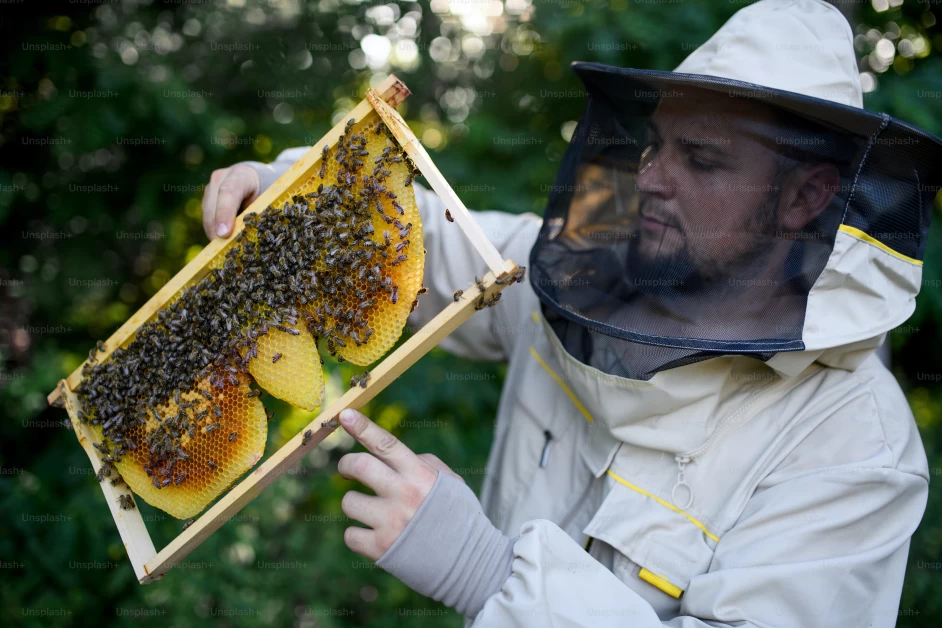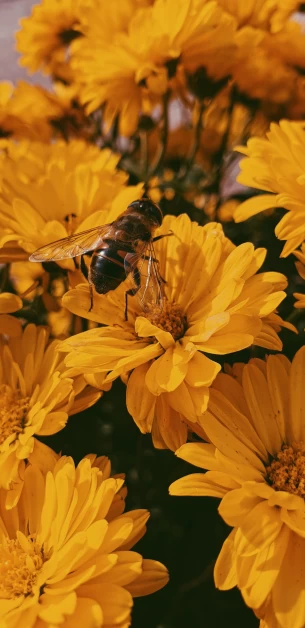Table of Contents
Introduction
The vegan community is divided when it comes to the question of whether honey is vegan or not. Some argue that since honey is an animal product, it goes against the principles of a vegan diet. However, there are others who consume honey as part of their plant-based diet, often because they don’t consider bees to be animals. Understanding how bees produce honey and the ethical concerns surrounding the industry can help shed light on this debate.
What is Honey?
Honey is a thick, sweet, gold- or amber-colored liquid that is made by female honeybees. The primary role of male honeybees is to mate with the queen. Female honeybees fly far from their hive to collect nectar, which is the sugary juice found in the center of flowering plants. They store the collected nectar in the first chamber of their stomachs and fly back to the hive when they have a full load. The nectar is then regurgitated and passed from one worker bee to another through their mouths, reducing the water content of the nectar.
As the water content decreases from its normal 70 to 80 percent to 18 percent, bacteria and mold cannot grow, and the nectar transforms into honey. The honeybees store the honey in hexagon-shaped honeycomb cells made of wax. Honey is produced by honeybees to feed their offspring and to stockpile for the winter months when flowers are not in bloom.
Honeybee Populations
Bees play a vital role in agriculture, as they are responsible for pollinating approximately 80 percent of flowering plants worldwide. In the United States alone, there are an estimated 4,000 native bee species out of a total of 20,000 bee species worldwide. These bees are crucial for pollinating about 75 percent of the fruits, vegetables, and nuts grown in the country.
However, honeybees have been facing a major problem known as colony collapse disorder (CCD) since 2006. CCD is characterized by adult bees abandoning hives simultaneously and eventually dying. While the exact cause of CCD is still unknown, studies have linked pesticides to the phenomenon. Other possible factors include invasive mites, poor nutrition, and the stress that bees experience from being transported to multiple locations for pollination services.
Bee farmers in the US have been working to improve hive conditions, but the rate of colony loss is still significant. One innovative solution to CCD is the use of artificial intelligence. Beewise, a startup, has developed BeeHome, an autonomous, solar-powered hive that allows beekeepers to monitor and care for bees. The hive utilizes AI technology to identify the bees’ needs in real time, and it even includes a beekeeping robot to complement the bees’ natural intelligence.
It’s important to note that honeybees are not the only bee population facing challenges. Native bee species in North America, which are much more particular in their pollen-collecting habits, have been disappearing for decades due to competition with honeybees. Honeybees, being highly adaptable, can thrive in various environments and harvest nectar from almost any blooming plant. This competition has negative effects on the native pollinators, and native plants also suffer from reduced pollination efficiency.
Is Honey Vegan?
Determining the ethical implications of consuming honey requires an understanding of how the honey industry operates and its impact on bees. The commercial honey industry shares similarities with the dairy industry in terms of animal exploitation. Humans have been exploiting both cows and honeybees for thousands of years. Honeybees, like cows, are not native to North America and were imported from Europe to work as agricultural animals.
Similar to cows, honeybees are artificially inseminated, and both cows and bees are considered “expendable” by their respective industries. Bees are routinely killed before winter because it’s cheaper than feeding them. Furthermore, both industries profit from stealing the animals’ food and replacing it with inferior alternatives. In the case of bees, refined sugar or high fructose corn syrup is used. However, these substitutes are insufficient for the bees’ nutritional needs and can harm their immune system, making them more susceptible to pesticides.
Another consideration is the use of honey in animal testing. Honey, due to its healing properties, is sometimes tested on animals such as rabbits, dogs, and rats. These animals are subjected to painful injuries before honey is applied to their wounds.
Darko Mandich, a former bee-honey production worker, emphasizes that honey is not vegan. After realizing the harm caused to bees in the industry, he co-founded MeliBio, a San Francisco-based startup that produces real honey without bees.
Is Any Honey Ethical?
While some conscious consumers seek “ethical” honey, it is important to question whether any honey can truly be considered ethical. Bee farmers who claim to prioritize the welfare of bees over profit are often associated with this niche market. However, this approach disregards the inherent injustice of animal exploitation and is not representative of the commercial honey industry.
Consumers who seek “ethical” honey generally buy from beekeepers who practice “balanced,” “natural,” or “biodynamic” beekeeping. Balanced beekeepers only take honey when there is a surplus, while natural beekeepers create hives that mimic bees’ natural living conditions, such as using hollow logs. Biodynamic beekeepers consider themselves stewards of bees and interfere with bee colonies as little as possible.
Commercial bee farmers argue that the honey industry plays a crucial role in crop pollination and the conservation of bee populations. However, managed honeybees do not pollinate as effectively as their wild counterparts, and managing hives does not protect wild pollinators.
Native bees, which collect pollen from specific plants, are more efficient pollinators compared to honeybees. Managed honeybees often escape from hives and go feral, dominating various ecosystems. This dominance leads to reduced numbers and diversity of native pollinators, negatively impacting native plants.
Best Vegan Alternatives to Honey
For those looking for animal-free alternatives to honey, several products and brands offer viable options:
-
Agave: Derived from the agave plant, agave syrup is an excellent substitute for honey in tea or recipes. However, the production methods for agave syrup can be environmentally taxing and harmful to endangered bats.
-
Maple Syrup: Maple syrup is another great one-to-one replacement for honey in recipes. Properly tapped and well-tended maple trees can yield sap for over 100 years, making maple syrup a reasonably sustainable option.
-
Brown Rice Syrup: Also known as rice malt syrup, this honey alternative is commonly used in Asian foods and has gained popularity among consumers seeking plant-based sweeteners.
-
Mellody: MeliBio, a San Francisco-based startup, produces genuine honey without bees. Through a blend of plant science and microbial fermentation, MeliBio creates a honey alternative called Mellody that replicates the taste, texture, and viscosity of conventional honey.
-
Vegan Un-Honey: The Single Origin Food Co. offers Vegan Un-Honey in three flavors: Amber made from organic cane nectar, Blonde made from organic date nectar, and Copper made from organic coconut nectar.
-
Just-Like-Honey: Suzanne’s Specialties, based in New Jersey, produces Just-Like-Honey, which is made from a combination of brown rice syrup, agave syrup, maple syrup, and natural flavors.
-
Bee Free Vegan Honey: BlenditUp’s Bee Free Vegan Honey is made from organic apples. It can be used as a base for smoothies or as a sweetener in place of bee honey, agave, or sugar.
-
D’vash Organics: D’vash Organics offers date syrups made from just one ingredient. Their date syrup serves as a great honey alternative.
In conclusion, the debate over whether honey is vegan or not continues to divide the vegan community. Understanding how honey is produced by bees and the ethical concerns surrounding the industry can help inform this debate. For those seeking alternatives, a variety of vegan honey substitutes are available that offer similar taste and texture without exploiting bees.



